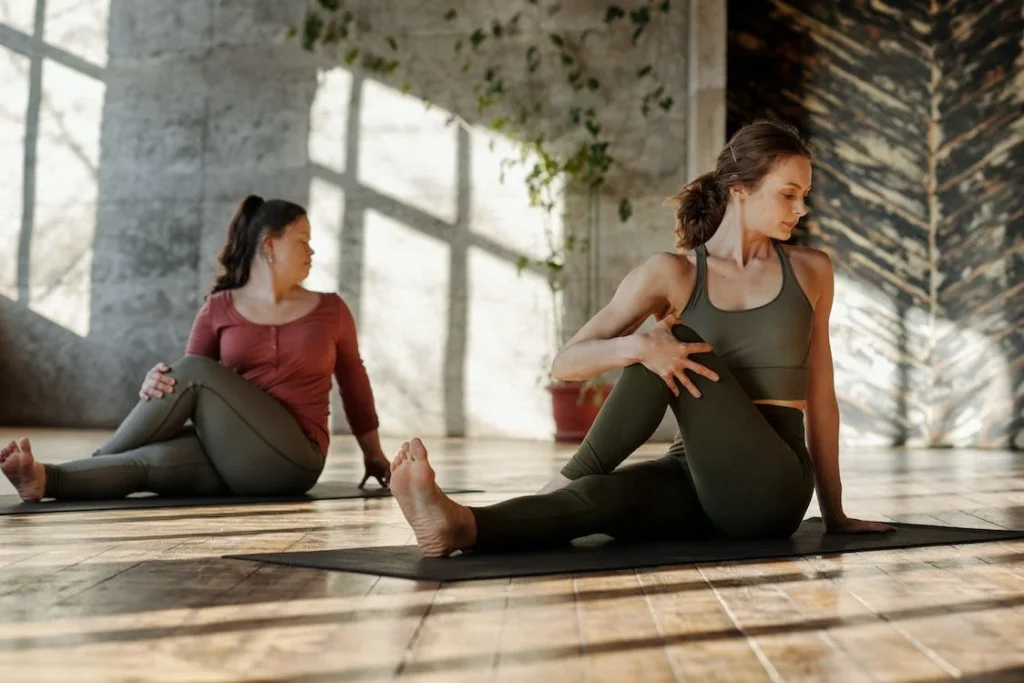
Yoga is a centuries-old practice that offers numerous physical and mental health benefits. For beginners, stepping onto the yoga mat can be intimidating, but with the right guidance and approach, it can be a transformative journey. In this comprehensive guide, we’ll explore the essential poses and practices for beginners, along with the benefits of incorporating yoga into your daily routine.
About Yoga for Beginners: Yoga is more than just a physical exercise; it’s a holistic practice that integrates breath, movement, and mindfulness to promote overall well-being. For beginners, it’s essential to start with simple poses and gradually build strength, flexibility, and confidence on the mat. With consistent practice and patience, beginners can experience the transformative power of yoga in their lives.
Pros of Yoga for Beginners:
- Gentle Introduction: Beginner-friendly yoga classes provide a gentle introduction to the practice, making it accessible to individuals of all fitness levels.
- Stress Relief: Yoga helps reduce stress by promoting relaxation, calming the mind, and lowering cortisol levels.
- Improved Flexibility: Regular practice of yoga poses helps increase flexibility by stretching and lengthening muscles and connective tissues.
- Strength Building: Many yoga poses require strength and stability, leading to improved muscle tone and overall strength.
- Mind-Body Connection: Yoga cultivates mindfulness, allowing practitioners to develop a deeper connection between mind, body, and breath.
Cons of Yoga for Beginners:
- Physical Limitations: Some beginners may experience physical limitations or discomfort when attempting certain poses, requiring modifications or adjustments.
- Frustration: Beginners may feel frustrated or discouraged if they struggle with balance, flexibility, or coordination in the beginning stages of practice.
- Overexertion: Pushing too hard or attempting advanced poses before building a foundation can lead to injury or strain.
Benefits of Yoga for Beginners:
- Stress Reduction: Yoga promotes relaxation and reduces stress, leading to improved mental and emotional well-being.
- Increased Flexibility: Regular practice of yoga poses improves flexibility and range of motion, reducing the risk of injury and enhancing overall mobility.
- Strength Building: Yoga poses strengthen muscles and improve stability, leading to better posture, balance, and overall strength.
- Mental Clarity: Yoga cultivates mindfulness and mental clarity, helping practitioners develop focus, concentration, and inner peace.
- Enhanced Well-being: The holistic nature of yoga promotes overall well-being, including improved mood, energy levels, and quality of sleep.
Why You Should Try Yoga for Beginners:
- Accessible to All: Yoga is accessible to individuals of all ages, fitness levels, and backgrounds, making it an inclusive and welcoming practice.
- Holistic Health Benefits: Yoga offers numerous physical, mental, and emotional health benefits, providing a comprehensive approach to wellness.
- Self-Exploration: Yoga encourages self-exploration and self-awareness, allowing practitioners to deepen their understanding of themselves and their bodies.
- Community and Support: Joining a yoga class or community provides support, accountability, and camaraderie on your yoga journey.
- Personal Growth: Practicing yoga fosters personal growth and transformation, empowering individuals to live more authentically and mindfully.
Conclusion: Yoga for beginners offers a gateway to improved physical, mental, and emotional well-being. With its gentle approach and numerous benefits, yoga is a valuable practice for individuals of all ages and fitness levels. By starting with essential poses and practices, beginners can lay a strong foundation for their yoga journey and experience the transformative power of the practice firsthand.
FAQ: Q: Do I need to be flexible to start practicing yoga? A: No, you don’t need to be flexible to start practicing yoga. Yoga is about meeting yourself where you are and honoring your body’s limitations. With consistent practice, flexibility will naturally improve over time.
Q: What should I wear to a yoga class for beginners? A: Wear comfortable, breathable clothing that allows for freedom of movement. Avoid wearing clothes that are too tight or restrictive, as they may impede your ability to move freely.
Q: How often should I practice yoga as a beginner? A: Aim to practice yoga at least 2-3 times per week to experience the benefits. Consistency is key, so try to establish a regular routine that works for your schedule and lifestyle.